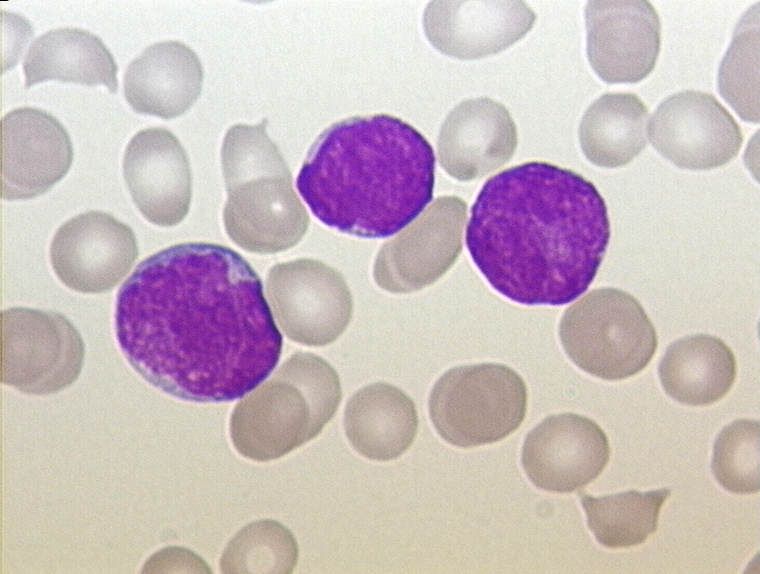CD19-Directed CAR T Improves OS in B-Cell Acute Lymphoblastic Leukemia
CAR T-cell therapy brexucabtagene autoleucel appears to produce an overall survival benefit among patients with relapsed or refractory B-cell acute lymphoblastic leukemia
Treatment with brexucabtagene autoleucel (Tecartus), a CAR T-cell therapy, resulted in a boost in overall survival (OS) among those diagnosed with relapsed or refractory B-cell acute lymphoblastic leukemia (ALL), according to a press release on 3-year follow-up data from the phase 1/2 ZUMA-3 trial (NCT02614066).1
“The continued durable response and significant improvement in survival indicated by these new data can potentially establish a new standard of care for adult patients living with this aggressive form of leukemia,” according to the lead investigator of the phase 1/2 ZUMA-3 trial.

With a median follow-up of 38.8 months (range, 32.7-44.6) in the phase 2 population of 55 patients, the 36-month OS rate was 47.1% (95% CI, 32.7%-60.2%). The median OS was 26.0 months for the overall population and 38.9 months among those who had complete remission (CR) or CR with incomplete hematologic (CRi) recovery (n = 39).
The overall CR plus CRi, CR, and subsequent allogenic stem cell transplant (alloSCT) rates were 71%, 56%, and 20%, respectively; these numbers were unchanged since the previous data cut. The median relapse-free survival (RFS) censored and uncensored at subsequent alloSCT, respectively, were 11.6 months (95% CI, 2.7-20.5) and 11.7 months (95% CI, 2.8-20.5).
“For adult patients living with ALL, there is a need for therapeutic options that provide long-term responses,” lead investigator Bijal Shah, MD, a medical oncologist at Moffitt Cancer Center in Tampa, Florida, said in the press release. “The continued durable response and significant improvement in survival indicated by these new data can potentially establish a new standard of care for adult patients living with this aggressive form of leukemia.”
Investigators of the ongoing, single-arm, open-label phase 1/2 ZUMA-3 trial are evaluating brexucabtagene autoleucel among patients with ALL whose diseases are refractory or have relapsed following standard systemic therapy or hematopoietic stem cell transplantation. In the second phase, patients received conditioning chemotherapy consisting of fludarabine at 25 mg/m2 and cyclophosphamide at 900 mg/m2 followed by a single intravenous infusion of brexucabtagene autoleucel at a target dose of 1 x 106 CAR T cells/kg.
The primary end point of the trial was overall CR or CRi rate by central assessment. Secondary end points included duration of response (DOR), RFS, OS, minimal residual disease negativity rate, and alloSCT rates.
Patients 18 years and older with relapsed or refractory B-cell ALL and morphological disease in the bone marrow were eligible to enroll on the trial. Additional inclusion criteria included having an ECOG performance status of 0 or 1 and adequate renal, hepatic, pulmonary and cardiac function.
Among 78 patients treated with the pivotal dose of brexucabtagene autoleucel in phase 1 and 2, the median follow-up at data cut-off was 41.6 months (range, 32.7-70.3). The median DOR was 18.6 months (95% CI, 9.6-24.1) censored and 20.0 months (95% CI, 10.3-24.1) not censored at subsequent alloSCT. Additionally, median RFS was 11.7 months (95% CI, 6.1-20.5) both censored and not censored, respectively. A total of thirty-six percent of patients were alive at the data cut-off and the median OS was 25.6 months (95% CI, 16.2-47.0).
Investigators reported that the proportion of patients in both phases with grade 3 or higher adverse effects (AEs) was unchanged vs the prior cut off. Additionally, there were no grade 5 AEs since the data cut-off.
The FDA previously approved brexucabtagene autoleucel for adult patients diagnosed with relapsed/refractory B-cell precursor ALL in October 2021.2 The approval was supported by data from the phase 1/2 ZUMA-3 trial.
References
- Kite’s Tecartus® CAR T-cell therapy demonstrates overall survival benefit in three-year follow-up of pivotal ZUMA-3 trial in relapsed/refractory B-cell acute lymphoblastic leukemia. News release. Kite, a Gilead Company. February 9, 2023. Accessed February 9, 2023. bit.ly/3xc2CRk
- FDA approves brexucabtagene autoleucel for relapsed or refractory B-cell precursor acute lymphoblastic leukemia. News release. FDA. October 1, 2021. Accessed February 9, 2023. https://bit.ly/3irFWFV